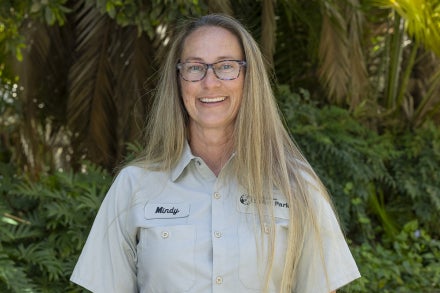
Zoo InternQuest is a seven-week career exploration program for San Diego high school juniors and seniors. Students have the unique opportunity to meet professionals working for the San Diego Zoo, Safari Park, and the Institute for Conservation Research, learn about their jobs, and then blog about their experience online. Follow their adventures here on the Zoo’s Website!
 When Becky Kier first went to college, she thought she would become a park ranger. She left with a bachelor's degree in Environmental Planning and Management, but she was uncertain about her previous career plan. Ms. Kier wasn’t interested in the law enforcement aspect of being a park ranger. She humored the idea of being a hiking guide, but eventually, she moved to San Diego and became a ticket seller at the San Diego Zoo. After getting her foot in the door, Becky Kier began working in the Children Zoo’s Petting Paddock.
Her current job in the Neonatal Assisted Care Unit (NACU) began with assisting with small tasks like sterilizing bottles, but before she knew it, grew into 28 years of work helping baby animals in need. Not every baby born at the Zoo comes to Ms. Kier and her four colleagues, only those who wouldn’t thrive without intervention. The main reasons an animal might have to receive assisted care include injury, infection, maternal death, maternal neglect, or a mother with an inadequate milk supply.
The NACU has very little warning when a baby will come in for help. However, Ms. Kier loves the flexibility of her job. She’s ready for any new challenge to be thrown her way. Every species is unique and needs individualized care. Part of that care includes the milk formulas that are administered to the babies several times a day. Every formula has detailed instructions from the Zoo’s Nutritionists about the various ingredients and proportions to best mic the baby’s mother’s milk. Ms. Kier and her coworkers use each baby animal’s morning weight to calculate how many milliliters of formula they need and their gastric capacity, or how much their stomach can hold, so they don’t feed them too much at once.
When Becky Kier first went to college, she thought she would become a park ranger. She left with a bachelor's degree in Environmental Planning and Management, but she was uncertain about her previous career plan. Ms. Kier wasn’t interested in the law enforcement aspect of being a park ranger. She humored the idea of being a hiking guide, but eventually, she moved to San Diego and became a ticket seller at the San Diego Zoo. After getting her foot in the door, Becky Kier began working in the Children Zoo’s Petting Paddock.
Her current job in the Neonatal Assisted Care Unit (NACU) began with assisting with small tasks like sterilizing bottles, but before she knew it, grew into 28 years of work helping baby animals in need. Not every baby born at the Zoo comes to Ms. Kier and her four colleagues, only those who wouldn’t thrive without intervention. The main reasons an animal might have to receive assisted care include injury, infection, maternal death, maternal neglect, or a mother with an inadequate milk supply.
The NACU has very little warning when a baby will come in for help. However, Ms. Kier loves the flexibility of her job. She’s ready for any new challenge to be thrown her way. Every species is unique and needs individualized care. Part of that care includes the milk formulas that are administered to the babies several times a day. Every formula has detailed instructions from the Zoo’s Nutritionists about the various ingredients and proportions to best mic the baby’s mother’s milk. Ms. Kier and her coworkers use each baby animal’s morning weight to calculate how many milliliters of formula they need and their gastric capacity, or how much their stomach can hold, so they don’t feed them too much at once.
 An important part of the feeding process is finding the right nipple to use. Some animals need long and thin nipples and others need shorter ones. It all depends on the shape and size of their mouth and snout. They also come in different materials, so some are firmer or softer than others. Ms. Kier uses her experience and expertise to find a nipple that the individual will like. The size of the hole is also crucial. With a hole too small, the baby will become frustrated because not enough milk is coming out. However, if a hole is too large, it means milk will come out faster than the animal can drink and swallow. That excess milk can make its way into the lungs, which is very dangerous. Due to this risk, the NACU members start with a smaller hole and enlarge it if the animal seems frustrated.
The daily routine in the NACU involves a bit more than just feeding. Every animal in their care is weighed and has their temperature taken. This information is written in detailed records to track their health and progress. They are then given any medications they might need and their bottles at time intervals. Ms. Kier also burps and helps the animals pass their food with stimulation similar to what their mom would have given. While direct interaction is a big part of working in the NACU, there’s still some work that needs to be done. Milk bottles can be breeding ground for bacteria, so Ms. Kier cleans, washes, and sterilizes bottles and feeding equipment each day. Another frequent task is mixing formula because it expires 48 hours after it’s made.
While it can be a lot of work, caring for the baby animals in the NACU is definitely worth it. Ms. Kier and her coworkers’ daily efforts profoundly affect the lives of the individual animals they nurse. They build relationships with them but also help those animals find themselves amongst their own species. Ms. Kier’s decades of work has allowed her to help dozens of individuals, many of which still recognize her and consider her part of their pack.
Carly, Careers Team
Week One, Winter Session 2018
An important part of the feeding process is finding the right nipple to use. Some animals need long and thin nipples and others need shorter ones. It all depends on the shape and size of their mouth and snout. They also come in different materials, so some are firmer or softer than others. Ms. Kier uses her experience and expertise to find a nipple that the individual will like. The size of the hole is also crucial. With a hole too small, the baby will become frustrated because not enough milk is coming out. However, if a hole is too large, it means milk will come out faster than the animal can drink and swallow. That excess milk can make its way into the lungs, which is very dangerous. Due to this risk, the NACU members start with a smaller hole and enlarge it if the animal seems frustrated.
The daily routine in the NACU involves a bit more than just feeding. Every animal in their care is weighed and has their temperature taken. This information is written in detailed records to track their health and progress. They are then given any medications they might need and their bottles at time intervals. Ms. Kier also burps and helps the animals pass their food with stimulation similar to what their mom would have given. While direct interaction is a big part of working in the NACU, there’s still some work that needs to be done. Milk bottles can be breeding ground for bacteria, so Ms. Kier cleans, washes, and sterilizes bottles and feeding equipment each day. Another frequent task is mixing formula because it expires 48 hours after it’s made.
While it can be a lot of work, caring for the baby animals in the NACU is definitely worth it. Ms. Kier and her coworkers’ daily efforts profoundly affect the lives of the individual animals they nurse. They build relationships with them but also help those animals find themselves amongst their own species. Ms. Kier’s decades of work has allowed her to help dozens of individuals, many of which still recognize her and consider her part of their pack.
Carly, Careers Team
Week One, Winter Session 2018
 When Becky Kier first went to college, she thought she would become a park ranger. She left with a bachelor's degree in Environmental Planning and Management, but she was uncertain about her previous career plan. Ms. Kier wasn’t interested in the law enforcement aspect of being a park ranger. She humored the idea of being a hiking guide, but eventually, she moved to San Diego and became a ticket seller at the San Diego Zoo. After getting her foot in the door, Becky Kier began working in the Children Zoo’s Petting Paddock.
Her current job in the Neonatal Assisted Care Unit (NACU) began with assisting with small tasks like sterilizing bottles, but before she knew it, grew into 28 years of work helping baby animals in need. Not every baby born at the Zoo comes to Ms. Kier and her four colleagues, only those who wouldn’t thrive without intervention. The main reasons an animal might have to receive assisted care include injury, infection, maternal death, maternal neglect, or a mother with an inadequate milk supply.
The NACU has very little warning when a baby will come in for help. However, Ms. Kier loves the flexibility of her job. She’s ready for any new challenge to be thrown her way. Every species is unique and needs individualized care. Part of that care includes the milk formulas that are administered to the babies several times a day. Every formula has detailed instructions from the Zoo’s Nutritionists about the various ingredients and proportions to best mic the baby’s mother’s milk. Ms. Kier and her coworkers use each baby animal’s morning weight to calculate how many milliliters of formula they need and their gastric capacity, or how much their stomach can hold, so they don’t feed them too much at once.
When Becky Kier first went to college, she thought she would become a park ranger. She left with a bachelor's degree in Environmental Planning and Management, but she was uncertain about her previous career plan. Ms. Kier wasn’t interested in the law enforcement aspect of being a park ranger. She humored the idea of being a hiking guide, but eventually, she moved to San Diego and became a ticket seller at the San Diego Zoo. After getting her foot in the door, Becky Kier began working in the Children Zoo’s Petting Paddock.
Her current job in the Neonatal Assisted Care Unit (NACU) began with assisting with small tasks like sterilizing bottles, but before she knew it, grew into 28 years of work helping baby animals in need. Not every baby born at the Zoo comes to Ms. Kier and her four colleagues, only those who wouldn’t thrive without intervention. The main reasons an animal might have to receive assisted care include injury, infection, maternal death, maternal neglect, or a mother with an inadequate milk supply.
The NACU has very little warning when a baby will come in for help. However, Ms. Kier loves the flexibility of her job. She’s ready for any new challenge to be thrown her way. Every species is unique and needs individualized care. Part of that care includes the milk formulas that are administered to the babies several times a day. Every formula has detailed instructions from the Zoo’s Nutritionists about the various ingredients and proportions to best mic the baby’s mother’s milk. Ms. Kier and her coworkers use each baby animal’s morning weight to calculate how many milliliters of formula they need and their gastric capacity, or how much their stomach can hold, so they don’t feed them too much at once.
 An important part of the feeding process is finding the right nipple to use. Some animals need long and thin nipples and others need shorter ones. It all depends on the shape and size of their mouth and snout. They also come in different materials, so some are firmer or softer than others. Ms. Kier uses her experience and expertise to find a nipple that the individual will like. The size of the hole is also crucial. With a hole too small, the baby will become frustrated because not enough milk is coming out. However, if a hole is too large, it means milk will come out faster than the animal can drink and swallow. That excess milk can make its way into the lungs, which is very dangerous. Due to this risk, the NACU members start with a smaller hole and enlarge it if the animal seems frustrated.
The daily routine in the NACU involves a bit more than just feeding. Every animal in their care is weighed and has their temperature taken. This information is written in detailed records to track their health and progress. They are then given any medications they might need and their bottles at time intervals. Ms. Kier also burps and helps the animals pass their food with stimulation similar to what their mom would have given. While direct interaction is a big part of working in the NACU, there’s still some work that needs to be done. Milk bottles can be breeding ground for bacteria, so Ms. Kier cleans, washes, and sterilizes bottles and feeding equipment each day. Another frequent task is mixing formula because it expires 48 hours after it’s made.
While it can be a lot of work, caring for the baby animals in the NACU is definitely worth it. Ms. Kier and her coworkers’ daily efforts profoundly affect the lives of the individual animals they nurse. They build relationships with them but also help those animals find themselves amongst their own species. Ms. Kier’s decades of work has allowed her to help dozens of individuals, many of which still recognize her and consider her part of their pack.
Carly, Careers Team
Week One, Winter Session 2018
An important part of the feeding process is finding the right nipple to use. Some animals need long and thin nipples and others need shorter ones. It all depends on the shape and size of their mouth and snout. They also come in different materials, so some are firmer or softer than others. Ms. Kier uses her experience and expertise to find a nipple that the individual will like. The size of the hole is also crucial. With a hole too small, the baby will become frustrated because not enough milk is coming out. However, if a hole is too large, it means milk will come out faster than the animal can drink and swallow. That excess milk can make its way into the lungs, which is very dangerous. Due to this risk, the NACU members start with a smaller hole and enlarge it if the animal seems frustrated.
The daily routine in the NACU involves a bit more than just feeding. Every animal in their care is weighed and has their temperature taken. This information is written in detailed records to track their health and progress. They are then given any medications they might need and their bottles at time intervals. Ms. Kier also burps and helps the animals pass their food with stimulation similar to what their mom would have given. While direct interaction is a big part of working in the NACU, there’s still some work that needs to be done. Milk bottles can be breeding ground for bacteria, so Ms. Kier cleans, washes, and sterilizes bottles and feeding equipment each day. Another frequent task is mixing formula because it expires 48 hours after it’s made.
While it can be a lot of work, caring for the baby animals in the NACU is definitely worth it. Ms. Kier and her coworkers’ daily efforts profoundly affect the lives of the individual animals they nurse. They build relationships with them but also help those animals find themselves amongst their own species. Ms. Kier’s decades of work has allowed her to help dozens of individuals, many of which still recognize her and consider her part of their pack.
Carly, Careers Team
Week One, Winter Session 2018



